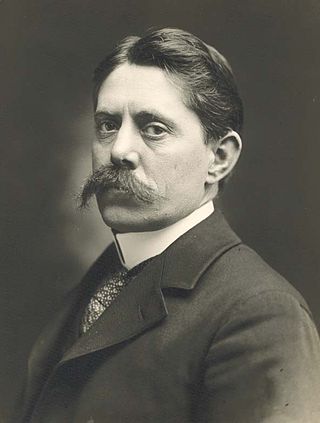
Harry Hill McAlister was an American lawyer and politician who served as the 37th governor of Tennessee from 1933 to 1937. He also served as Nashville's city attorney in the early 1900s, and as Tennessee's state treasurer in the 1920s and early 1930s. Inaugurated as governor at the height of the Great Depression, McAlister enacted massive spending cuts in an attempt to stabilize state finances. He coordinated federal programs in the state aimed at providing Depression-era relief.

Alfred Alexander Taylor was an American politician and lecturer from eastern Tennessee. He served as the 34th governor of Tennessee from 1921 to 1923, one of three Republicans to hold the position from the end of Reconstruction to the latter half of the 20th century. He also served three terms in the U.S. House of Representatives, from 1889 to 1895.

John Isaac Cox was an American politician who served as the 29th governor of Tennessee from 1905 to 1907. He was elevated to the position when Governor James B. Frazier resigned, and, as Speaker of the Tennessee Senate, he was the first in the line of succession. He failed to win his party's nomination for a second term, and returned to the state senate, where he remained until 1913. Cox also served as a county judge, city attorney, and local postmaster, and spent two terms in the Tennessee House of Representatives.

Robert Love Taylor was an American politician, writer, and lecturer. A member of the Democratic Party, he served three terms as the 24th governor of Tennessee, from 1887 to 1891, and again from 1897 to 1899, and subsequently served as a United States senator from 1907 until his death. He also represented Tennessee's 1st district in the United States House of Representatives from 1879 to 1881, the last Democrat to hold the district's seat.

Benton McMillin was an American politician and diplomat. He served as the 27th governor of Tennessee from 1899 to 1903 and represented Tennessee's 4th district in the United States House of Representatives from 1879 to 1899. He served as a diplomat during the administration of President Woodrow Wilson, initially as Minister to Peru (1913–1919) and afterward as Minister to Guatemala (1920–1921).

Malcolm Rice Patterson was an American politician and jurist. He served in the U.S. House of Representatives from 1901 to 1906, and as the 30th governor of Tennessee from 1907 to 1911. He later served as a circuit court judge in Memphis (1923–1934), and wrote a weekly column for the Memphis Commercial Appeal (1921–1933).

Ben Walter Hooper, was an American politician who served two terms as the 31st governor of Tennessee from 1911 to 1915. Elected as a Fusionist candidate, he was one of just three Republicans to hold the office from the end of Reconstruction to the last quarter of the 20th century. His success was due to divisions in the state Democratic Party over prohibition; he received support from some of the party. During his two terms, Hooper signed several prohibition laws, enacted a measure requiring mandatory school attendance, and signed a law requiring direct pay for women workers.

Thomas Clarke Rye was an American politician who served as the 32nd governor of Tennessee from 1915 to 1919. An ardent supporter of prohibition of alcoholic beverages, he helped reunify the state's Democratic Party, which had been divided over the issue for nearly a decade. Rye is perhaps best remembered for enacting the "Ouster Law," which was aimed at curbing the power of political boss E. H. Crump.

Richard Wilson Austin was an American politician, attorney and diplomat. A Republican, he served in the United States House of Representatives from 1909 to 1919, representing Tennessee's 2nd district. Prior to his congressional tenure, he worked as a United States Marshal from 1897 to 1906, and served as the U.S. consul to Glasgow, Scotland, from 1906 to 1907.

The Tennessee Democratic Party (TNDP) is the affiliate of the Democratic Party in Tennessee. The party was founded in 1826 initially as the Jacksonian Party. The Tennessee Democratic Party was born out of President Andrew Jackson's populist philosophy of Jacksonian democracy in the mid to late-1820s. After Jackson left office, the Democratic Party struggled in the state as the Whig Party would go on to be the dominant party in Tennessee until its collapse after the 1852 Election. Prior to the Civil War, as a result of the collapse of the former Whig Party, the Democratic Party became the dominant party in the state. After the war ended, the Republican Party would be the dominant political party during Reconstruction, but once Reconstruction ended, the Democratic Party would dominate Tennessee Politics up until 2011 when the Republican Party would gain firm control of Tennessee State Government.

The 1912 United States presidential election in Tennessee took place on November 5, 1912, as part of the 1912 United States presidential election. Tennessee voters chose twelve representatives, or electors, to the Electoral College, who voted for president and vice president.

The 1916 United States presidential election in Tennessee was held on November 7, 1916. Tennessee voters chose twelve representatives, or electors, to the Electoral College, who voted for president and vice president.

The 1934 Tennessee gubernatorial election was held on November 6, 1934. Incumbent Democratic governor Hill McAlister won re-election to a second term, defeating Independent nominee Lewis S. Pope in a rematch with 61.8% of the vote.

The 1914 Tennessee gubernatorial election was held on November 3, 1914. Democratic nominee Thomas Clarke Rye defeated incumbent Republican governor Ben W. Hooper with 53.55% of the vote.

The 1924 Indiana gubernatorial election took place on November 4, 1924 under the provisions of the Constitution of Indiana. It was the 31st gubernatorial election in the State of Indiana. Republican Edward L. Jackson defeated Democrat Carleton B. McCulloch. The election took place concurrently with the 1924 United States elections that saw Republicans hold the White House and increase their majorities in both houses of Congress.

The 1908 Tennessee gubernatorial election was held on November 3, 1908. Incumbent Democratic governor Malcolm R. Patterson defeated Republican nominee G. N. Tillman with 53.73% of the vote.

The 1906 Tennessee gubernatorial election was held on November 6, 1906. Following the death of Senator William B. Bate in March 1905, governor James B. Frazier quickly convened the General Assembly and had himself elected to the vacant Senate seat. John I. Cox, who as speaker of the state senate was Frazier's constitutional successor, then became governor. Malcolm R. Patterson narrowly defeated governor Cox for the Democratic nomination. In the general election, Patterson defeated Republican nominee Henry Clay Evans with 54.42% of the vote. Evans also ran for governor in 1894, but narrowly lost.

The 1898 Tennessee gubernatorial election was held on November 8, 1898. Incumbent Democratic governor Robert Love Taylor did not seek re-election. Democratic nominee Benton McMillin defeated Republican nominee James Alexander Fowler with 57.92% of the vote.

The 1896 Tennessee gubernatorial election was held on November 3, 1896. Former Democratic governor Robert Love Taylor narrowly defeated Republican nominee G. N. Tillman with 48.75% of the vote.

The 1892 Tennessee gubernatorial election was held on November 8, 1892. Democratic nominee Peter Turney defeated Republican nominee George W. Winstead, and Incumbent Governor John P. Buchanan, who ran as a Populist, with 47.86% of the vote.
















